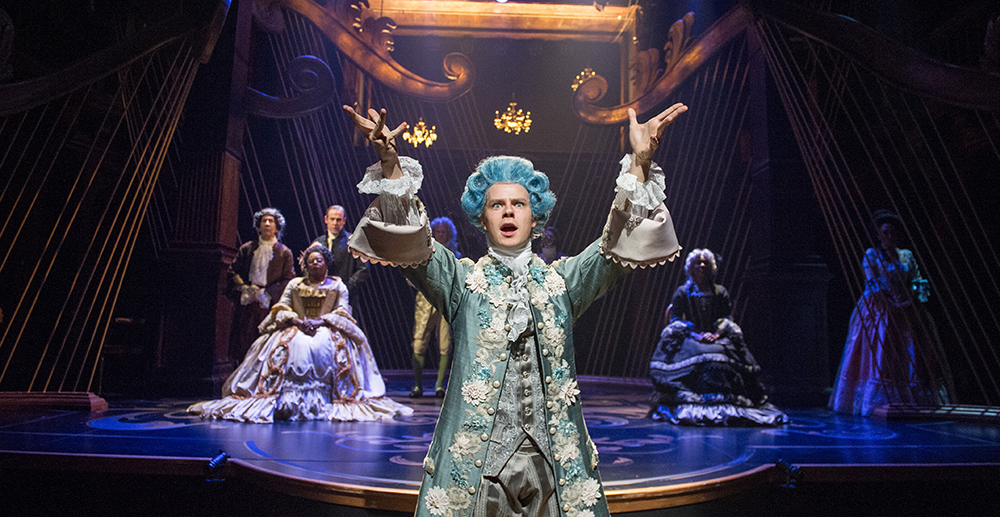Culture
 Wolfgang Amadeus Mozart (Samuel Adams) conducts his orchestra for the Viennese court in Folger Theatre’s Amadeus // Photo: C. Stanley
Wolfgang Amadeus Mozart (Samuel Adams) conducts his orchestra for the Viennese court in Folger Theatre’s Amadeus // Photo: C. Stanley
Folger Theatre’s Amadeus Deals With Questions of Hate and Immortality
November 18, 2019 @ 12:00am
When visiting the Folger Theatre located in the Folger Shakespeare Library on Capitol Hill, patrons will witness and appreciate the craftsmanship of five 15th Century styled harps reaching soaring heights, fixed within the dimly lit ligneous theatre. After a short time, visitors will soon come to realize these grand instruments evolve into a metaphoric prison cell restraining court composer, Antonio Salieri in his self-made abyss, where lies envy and resentment, his only comrades.
Set in 1823 Vienna, Peter Shaffer’s Amadeus, directed by Richard Clifford, opens with echoes of gasps and whispers, serving as rumors circling an empty 18th-century wheelchair. Two actors named Venticello enter expounding on the tales of events that took place thirty years prior. The play runs through December 22.
“Who killed Wolfgang Amadeus Mozart?”
The question is immediately answered, purportedly, once a seemingly aged Salieri, played by the dynamic Ian Merrill Peakes, takes his seat in the vacant chair. Rolling back and forth, Peakes delivers an almost believable performance as a man confined and matured by unforgiving transgressions. The alteration in his tone of voice, and the quivering words spoken, warrants audiences’ trust in his elder persona. Oddly, glimpses of humor and strength dissipate his “grandfather” façade, making for a unique transition to 1781 that monopolizes this modest 2-hour and 45-minute production.
For the 31-year old Salieri, Peakes fully embodies the stoic and oddly physically mature nature. Ranting on about his God-given gifts, his commitment to composing operas “in the name of God,” and his desire to reign as the supreme composer worldwide, Peakes’ endearing portrayal elicits feelings of empathy for someone fearing to lose their earned and widely coveted position on top.
Relying on hearsay, Salieri forms a notion of Mozart, played by the boyish Samuel Adams, that is inevitably disastrous to himself.
After meeting Mozart and witnessing his talents, that are far ahead of the times, Salieri begins to plot mischievously against Mozart.
In all honesty, Clifford’s recreation of Amadeus is genuinely clever. Capturing elements exemplified in the Tony Award and Oscar-winning renditions, Clifford brings forth a production that relies solely on the exquisite oratorical capabilities of its cast members, and the elegantly pristine garments perfectly positioning viewers in an 18th-century opera house.
Though music serves as the foundation of this story, and the source of contention, theatergoers should not expect live vocals or a grand orchestra, but rather recordings that manage to prompt well-deserving chills. Classical tunes and operatic arias play through the sound system and more than suffice in depicting Mozart’s musical prodigy and the growth in Salieri’s antipathy.
Perfectly parallel to Peakes’ menacing antics as Salieri, is Adams’ charming, yet infantile and vulgar disposition of Mozart. Personifying Mozart is a task Adams achieves with each breath. His occasionally nervous but often obnoxious shrill of a laugh and multi-color hair is both humorous and infectious.
Even though Adams prances and crawls onstage, spewing uncouth verbiage, he maintains an air of innocence that allows his unceasing advancements in his artistry.
Supporting Adams is Lilli Hokama as Constanze Weber, Mozart’s fiancée. Hokama introduces a lightness to the narrative that is needed to pierce the tomfoolery of Mozart and the bitterness of Salieri.
Sashaying around the stage, Hokama appropriately flits with grace as her garments adorned give nodes of lushness. Though she may be initially perceived as a dolt, with time, she proves to be quite a force to be reckoned.
When she rifles with the prospects of infidelity, her inner strength surfaces, paving a precise way forward during a patriarchal time.
In the original production and film, the themes within Amadeus hold firm, and Clifford’s take relishes in each one respectfully.
Brutal language is exaggerated perfectly, presenting the often-hidden crudity within aristocratic life.
Sex is referenced countless times as the source of inspiration in the artistic realm and is frequently deployed as a tactic enacting one’s power over another. God as the life-giver and taker is most haunting as lamentations transcend varying degrees of religious discourse. But all in all, the two themes that resonate most profoundly are hate and immortality.
I once heard that hating someone is like taking poison and expecting them to die. At the core of this theatrical masterpiece lies this fundamental truth. As Salieri hopes to live on forever through his musical accomplishments, his disdain for Mozart has the opposite effect. He marvels at the unending growth of Mozart, scheming continuously to undermine his success, only to spiral deeper into the void of unrelenting spite, where absolution is never achieved.
Amadeus is showing at the Folger Theatre located in The Folger Shakespeare Library through December 22. Tickets are $42-$85 and can be purchased online at www.folger.edu/theatre.
Folger Theatre: 201 East Capitol St. SE , DC; 202-695-7263; www.folger.edu/folger-theatre







